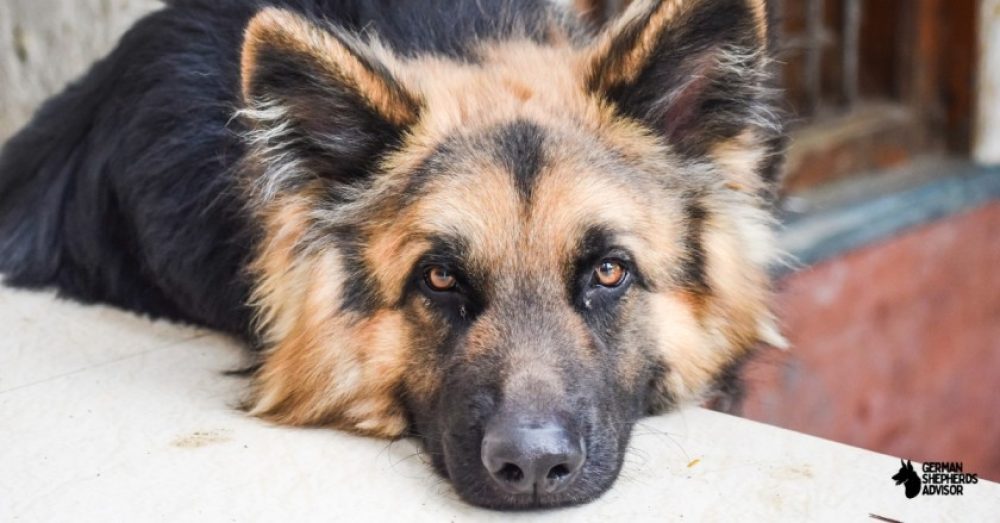If you are wondering can German shepherd live in apartment, the answer is yes. German shepherds can make great apartment dogs, but there are a few things you need to keep in mind. First, be sure that your apartment allows dogs. Many apartments do not allow breeds that are considered more aggressive, like German shepherds.
Second, make sure your German shepherd is obedience trained. An unruly dog can quickly become a nuisance to neighbors in an apartment complex. Third, be sure to provide plenty of exercise for your German shepherd. A tired dog is less likely to get into trouble. Fourth, be prepared to clean up messes. Even the best-behaved dog can have an accident now and then.
Fifth, consider investing in some training equipment like a kennel or doggy gate to make sure your German shepherd can’t get into mischief while you are at work.
In today’s fast-paced life, people can’t afford to have a large house with a backyard. An apartment can give them space and time for themselves without worrying about the maintenance required in houses. However, having pets is another matter altogether.
Can German Shepherd Live In Apartment?
Before we can answer this question we need to first find out if it is realistic to keep a dog in an apartment at all. Some dogs can be just as happy living in apartments as can be others which prefer wide-open spaces.
For example, smaller breeds such as Dachshunds and Lhasa Apsos can live happily in apartments but Mastiffs or Great Danes cannot survive well on cramped quarters even though they may be for short durations. The German Shepherd can be one of the breeds that can live both in apartments and houses.
They are not as large as a Mastiff or Great Dane and do not require a lot of exercises, which can make them good apartment dogs. However, if you live in an apartment with no outdoor space for your dog to relieve himself, then this may not be the best breed for you.
Some people may think that since GSDs are bred as working dogs they will become restless and destructive in apartments. This is not always the case; GSDs can be just as happy living in small spaces if they are properly exercised and given enough toys and playtime.
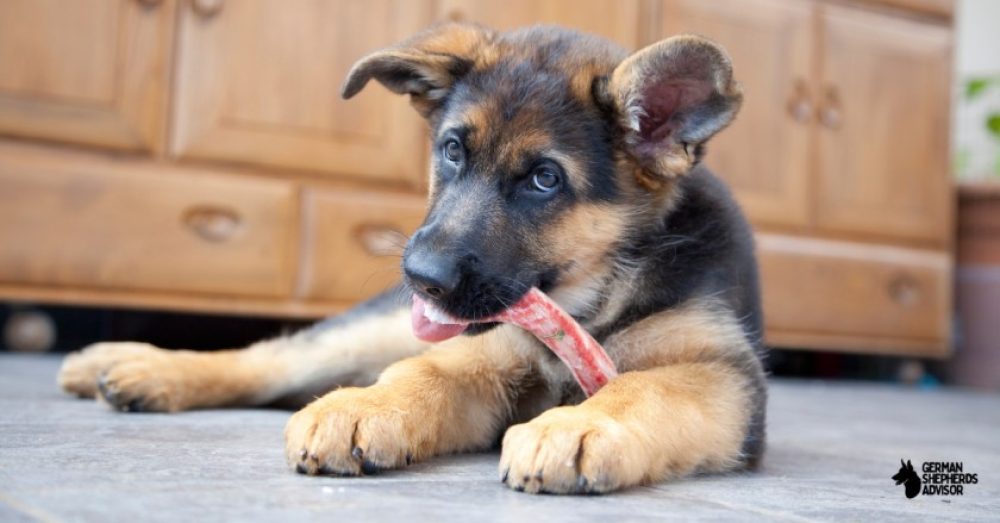
Important to understand the nature of German Shepherds
When it comes to apartment living, many dog owners have concerns about whether or not their favorite breed of dog can adapt. For those who are wondering if a German shepherd can live in an apartment, the answer is yes – with some caveats.
First and foremost, it’s important to understand that German shepherds require a moderate amount of exercise. If you’re not able to take your dog for a long walk or run every day, then an apartment may not be the best fit. Additionally, GSDs need plenty of room to roam and play, so a small apartment may not be suitable.
That said, if you can provide your German shepherd with the exercise he needs and enough space to roam, they can make great apartment dogs.
German shepherds are extremely adaptable and they will attempt to make do with what they have available, including their space. Apartment living does not mean your shepherd will be miserable; it just means you may need to get creative about daily exercise routines.
Apartment Living: German Shepherd Basic Needs
For example, if the place where you live has a dog park nearby, then that can be a great place for an extended play date that gets your German shepherd the exercise he needs. It’s also important to note that GSDs are very intelligent dogs, so training them is relatively easy as long as you keep sessions short but frequent.
Taking time each day to train your German shepherd will help him cope better in an apartment setting because his reward for being obedient is.
If you are considering a German shepherd as your new apartment pet, there are a few things you need to know. First and foremost, GSDs need plenty of exercise and room to run. They are not well-suited for small living spaces.
That said, if you can provide your dog with the exercise he needs and enough space to roam, a GSD can make a great apartment pet.
Just be sure to set some basic ground rules:
➡️ Noise and bark control: No barking or whining at all hours of the day and night – this is sure to drive your neighbors crazy! Be mindful of when and where your dog barks. Apartment life is quieter than most people are used to, so they might bark more frequently when you’re gone or in the evenings when it’s quiet.
➡️ GSD poop: Always clean up after your dog in the apartment and on walks – no one wants to step in GSD poop!
➡️ Dealing with exercise requirement: Maintain a regular routine of exercise with your dog. GSDs have no problem adjusting to new routines if you do it gradually. They work best with a daily routine of exercise, playtime, potty breaks, and meals – just like an adult working person. Be sure to keep this routine steady even on weekends.
➡️ Socialization strategies: Socialize your German shepherd early on. GSDs are naturally protective dogs who are very aware of their surroundings, but that does not mean all strangers should be seen as bad guys! Socializing them at an early age will help them become more relaxed and accepting of people and other animals.
If you can provide your GSD with a comfortable room in the apartment that has plenty of space to jump and play. He would consider it a wonderful place for him to live. Just be sure to set some basic rules and guidelines to make everyone’s life easier!
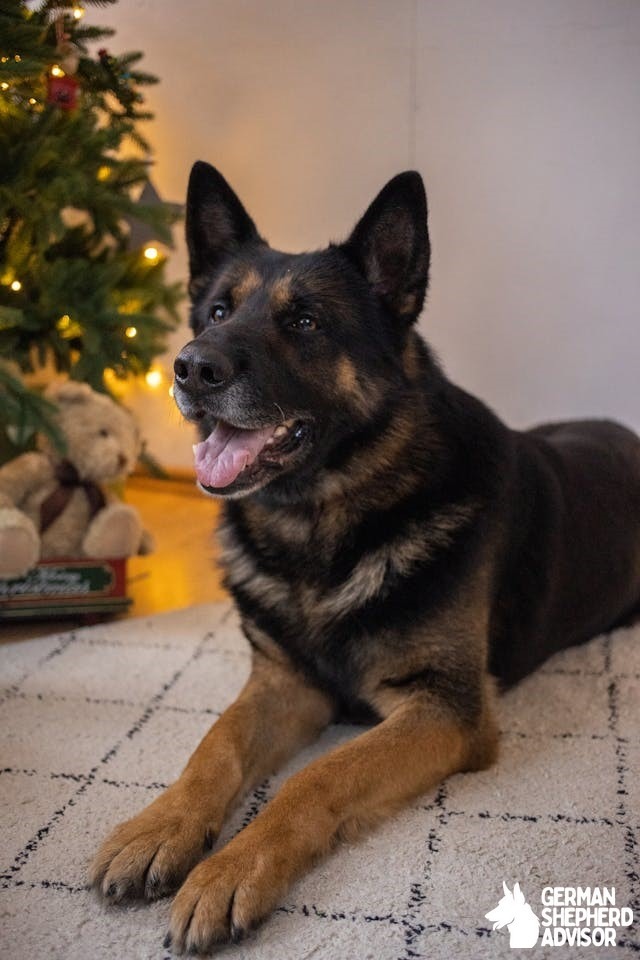
Photo by: KATRIN BOLOVTSOVA
How to help your German shepherd live in an apartment?
German shepherd are one of the most faithful companion dog breed. They are wonderful with kids and will be your best friend. But there is one thing that many people might not realize about German shepherds.
They shed a lot, especially twice a year when they molt. This can make having them in an apartment difficult if you don’t have the space to deal with all their hair everywhere every day.
Apartment-Friendly German Shepherd Exercise and Activity Ideas
If you’re anything like me, you love your German Shepherd but don’t have the space for a large yard in which to run and play. Don’t worry though – there are plenty of activities and exercises you can do with your GSD indoors or in a small yard that will keep them happy and healthy!
The following tips on how to help your German shepherd live in an apartment should help you keep both of you happy!
1. Clean Ears
German shepherds cannot stand dirty ears. Keeping their ears clean is very important for them because it helps fight bad ear infections which are common among dogs because of way their ear flaps trap.
If you’re an apartment dweller with a German shepherd, you know that exercise and activity are key to keeping your dog healthy and happy. But with limited space, it can be tough to come up with ideas that work for both of you.
2. Regular exercise, walk and Playful activities
One great option is to take them for walks around your neighborhood. This gets their blood flowing and gives them a chance to explore new smells. Be sure to always keep them on a leash, as they may want to chase after something they see. This is a great way to get some exercise and fresh air both of you can enjoy.
Play fetch in the park or in your backyard. This is a great way to get your dog moving and burn off some energy. Go for bike rides together. If your dog is comfortable riding in a bike trailer, take her along for the ride as you pedal.
3. Indoor activities
Play tug with your dog indoors. While technically, indoor play is still playtime, it’s not as strenuous as running around outside. For dogs who like to chew, keeping them busy with an interactive toy (like a Kong or Buster Cube) can be a great way to stop destructive chewing and give them some exercise at the same time. This also helps promote their mental health by keeping them stimulated!
4. Car rides
Take your dog for car rides . It might seem counterintuitive, but taking your German shepherd for car rides is an easy way to build both of your exercise into even just small errands you run during day — especially if there are parks or other interesting sights to see along the way.
5. Obedience classes
Another great option is to enroll them in obedience classes. This will help keep them mentally stimulated while also teaching them basic commands. It’s also a great way for them to socialize with other dogs.
If you have a small yard, consider setting up a few agility obstacles for your dog to play on. This can include things like a makeshift agility course or even just a few sturdy boxes that your dog can jump over or climb on.
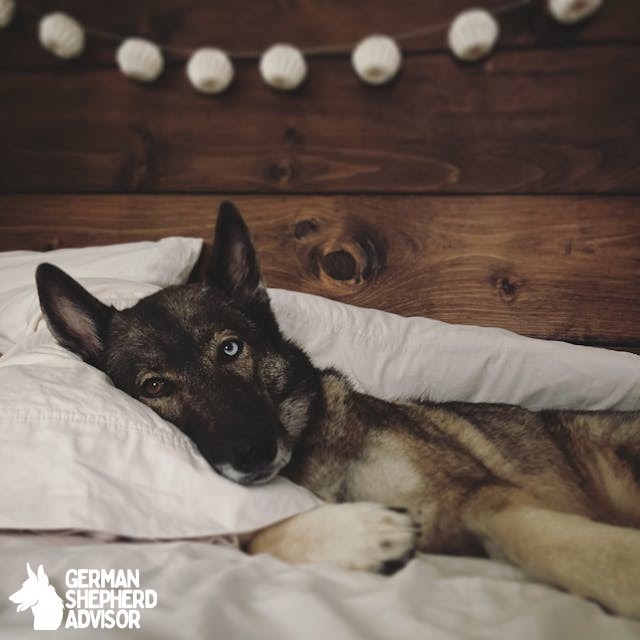
Photo by: Emily Fuller
6. Play tug-of-war
Finally, make sure to give your GSD plenty of opportunity to play fetch or tug-of-war. These games are a great way to get them moving and help wear them out. Plus, they’re a lot of fun for both of you!
Just be sure to keep an eye on your German Shepherd during these activities and adjust the intensity and duration depending on their age and fitness level. With a creativity, you can keep your apartment-friendly German Shepherd as healthy and happy as a larger dog!
As you can see, there are plenty of ways to get your German shepherd the exercise and activity she needs, even if you live in an apartment. With a little creativity and some effort, you and your furry friend can stay healthy and happy!
Do’s & Don’ts for Living in an Apartment with a German Shepherd
If you live in an apartment and are considering adopting a German shepherd , then it’s important that you do your research first. You need to be aware of the specific Do’s and Don’ts for living with this breed and what you can expect from them.
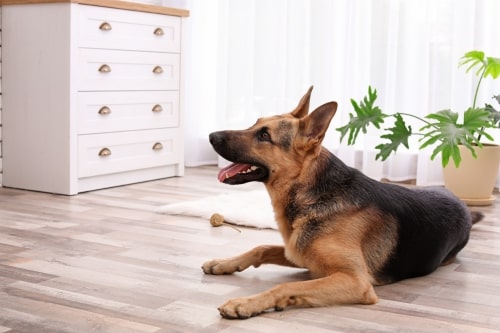
German Shepherds are powerful, intelligent, and highly obedient. They were bred as herding dogs originally – which is why they have such high energy levels – but there are certain Do’s and Don’ts than any new owner needs to consider before adding one to their family.
Do’s:
- Exercise your dog regularly, every day if possible. A German shepherd needs at least one hour of exercise every day to stay healthy and happy.
- Make sure your house or apartment is properly secured. A German shepherd is an escape artist and will try to get out if he can.
- Start training your dog from a young age. They are very intelligent and can be easily trained, but you need to start early.
- Have plenty of chew toys on hand. This breed loves to chew and will find ways to destroy anything they can get their teeth on, including furniture, shoes, and wires.
Don’ts:
- Do not leave your dog alone for long periods of time . He will become bored and may become destructive.
- Do not give your dog too many people food. Not only does this make him fat, but it can also cause life-threatening stomach issues.
- Do not let your German shepherd jump out of a window or up on furniture. He is extremely strong and can easily break bones or injure himself if he jumps from a height.
If you keep these Do’s and Don’ts in mind when you bring a new German shepherd into your family, then you will provide him with the best chance of living up to his potential as an amazing and loyal pet.
As part of the Do’s and Don’ts:
- Do not keep a German Shepherd alone in an apartment.
- Do train a German Shepherd.
- Do get a dog walker.
- Do get a remote-controlled robot vacuum.
- Do get another animal Do get rid of your old things.
- Do crate your dog when you’re not home.
- Do keep your dog on a leash when you’re outside.
- Do feed your dog twice a day.
- Do give your dog bones and toys.
- Do have realistic expectations.
When it comes to living in an apartment with a German Shepherd, there are definitely some Do’s and Don’ts that should be followed. Let’s take a look at some of the most important ones.
First and foremost, don’t keep a German Shepherd in an apartment. They need plenty of space to run around and exercise and will become bored and restless if they’re cooped up all the time.
How long can German Shepherds be alone before it starts stressing out?
It all has to do with that dog’s level of anxiety. In general, the rule is that the younger the puppy, the longer he can remain without being supervised.
➡️ A two-month old pup cannot be left alone for more than a couple hours because puppies at this age need constant care.
➡️ A six- or eight-month old dog on the other hand may handle being home alone for as many as seven hours per day if they have regular exercise and company during those times. Any longer than this might cause problems for your pup, though.
Mental stimulation
As dogs get older, their ability to deal with being alone increases. A full-grown dog may be left alone for almost the entire day when the owner is at work if they get regular exercise and company during other times of the day.
Because age decreases a German Shepherds’ ability to handle extended time alone, most experts recommend providing an elderly German Shepherd with two walks per day for at least thirty minutes each (if you can’t do this yourself, consider hiring a pet sitter).
If your pup gets anxious when they are left alone, or if their separation anxiety does not improve even after you have done all that you can to help them cope (including consulting with your vet).
It might be best to find another home for them where someone is always there. If this isn’t possible, you can always look into a doggy daycare where they will be supervised and get the exercise they need.
Plenty of toys
No matter how long your German Shepherd can handle being alone, it is always important to provide them with plenty of toys and things to chew on so that they don’t get bored. Kong filled with treats or peanut butter are a great way to keep your pup occupied, as are puzzle toys that release food or treats as the dog plays with them. Anything to help keep them entertained will help make being away from you a little easier on them.
How much time can a German Shepherd spend alone?
German Shepherds are generally very good and quiet dogs and not too demanding as long as they get enough exercise. For German Shepherds, the general rule of thumb is that the smaller the dog breed, the more often it should be left alone to prevent separation anxiety or other problems.
The German Shepherd’s (and other large breed dogs) need about 2-3 hours alone per day. GSds should never be locked inside a crate for longer than three hours at a time because this could cause them psychological harm.
GSds love to eat, making them easy to train; German Shepherds also try their hardest not to make a mess around your house and will usually go and do their business outside (although if there is an accident, you must clean up the mess as quickly as possible to avoid German Shepherd and even German Shepherpherd marking).
Keep German Shepherd away from suspicious noises
German Shepherds tend to bark a lot if they feel threatened or hear suspicious noises, so keeping them in an environment with minimal noise is recommended.
They shed their coat twice a year for about three weeks each time; both times German Shepherd’s tend to leave more hair around the house than usual. German Shepherds usually live between 9-13 years, but do not reach full maturity until approximately 3 years old.
The role of German Shepherd’s owner
Because German Shepherd’s mature slowly, it’s important that owners take precautions against small children because German Shepherds may accidentally knock them over and injure them.
German Shepherds have very acute senses, making them excellent guard dogs. They can see and hear things that are undetectable to humans and can smell odors from great distances.
Conclusion
Although German Shepherds make excellent guard dogs, they can also be very friendly and loving animals and make great pets for families with older children. Owners should always remember though that German Shepherds are dogs first and should not be left alone for too long periods of time or else they may become bored, destructive, and anxious.
German Shepherds are also able to differentiate between human smells, so if an intruder attempts to disguise themselves as a family member, the German Shepherd will most likely be able to detect the difference.

